When Crete Slows Down: The Allure of Hania...
With fewer tourists, sunlit harbors, and...
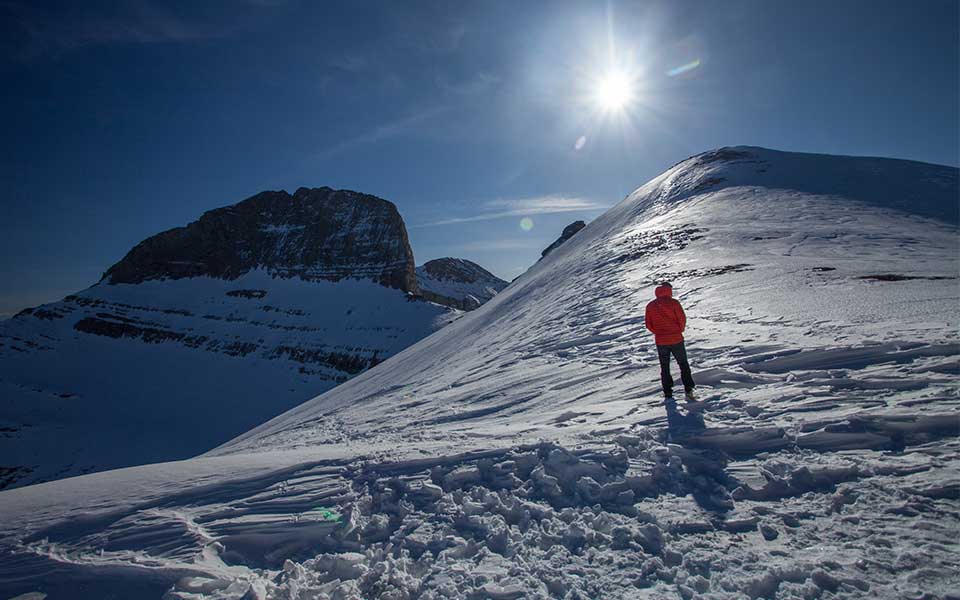
© Olga Charami
The snow was slowly melting away in a small pan that was just about balancing on a well-worn camping stove. The three of us, sitting cross-legged like worshipers, were staring at it as if it were the most precious thing in the world. How we savored this moment, in which we had no choice but to boil snow in order to drink water.
Tiny particles were floating about in the pan. The purification tablets that we would toss into the water got rid of them – along with my desire to drink it – and gave it a flavor that was just about bearable.
We had come here for the Clean Monday holiday and our pre-Lenten meal consisted of canned octopus and calamari, which tasted more than appalling: still, making up for these shortcomings was getting to enjoy our meal at an elevation of 2,650m on the enclosed balcony of the Giosos Apostolidis refuge, which remains open during winter to deal with any emergencies.
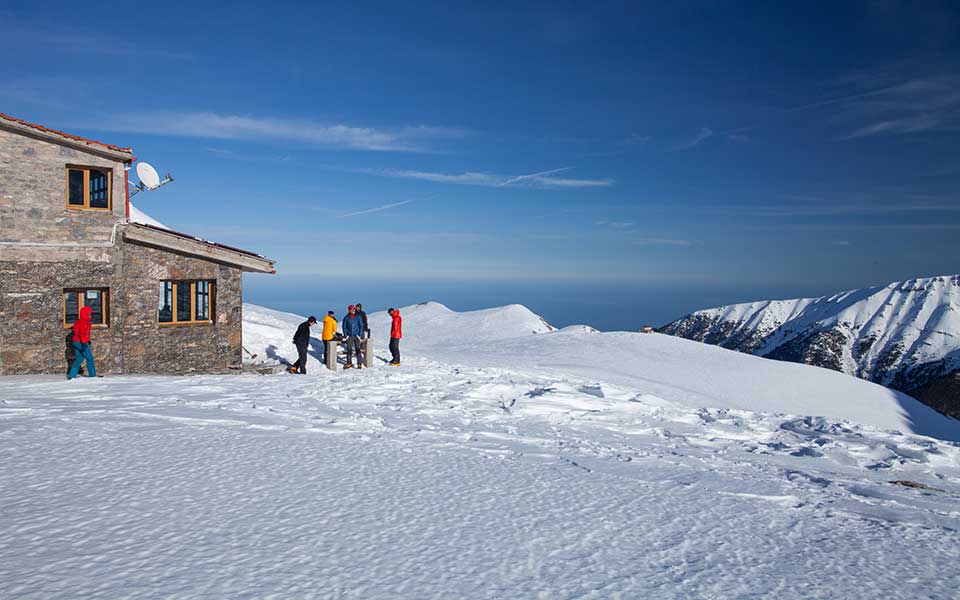
© Olga Charami
My nose was running like an open faucet, my lips were chapped and bleeding, and my fingertips were still numb even though I hadn’t stopped rubbing them. It had taken us a whopping 11 hours to get to the Plateau of the Muses.
Barely six months had passed since the last time I found myself on the Gortsia trailhead, but now I was tightly lacing my shoes, getting ready for yet another Mt. Olympus ascent – and this time during winter. The home of the 12 gods is simply a magnet that keeps calling you back for more.
Here I was, with crampons on my feet, ice axe in hand, wearing hiking boots that resembled tractors, gaiters, a vest, windbreaker, buff and beanie, and all-weather gloves… dressed up like a mountaineer ready for a carnival parade – as I am not really one. Winter hiking requires training in specialized schools; luckily, I was with my mountaineer friend Orestis Mitrou who had gotten us safely up this far.
However, we were less lucky during our ascent, as the dense snow concealed all traces of the winter route after we passed the Petrostrouga refuge. As a result, we proceeded along the summer path, hip-deep in the snow, with each of my legs weighing 100 kg due to fatigue; this doubled the effort and the walking time.
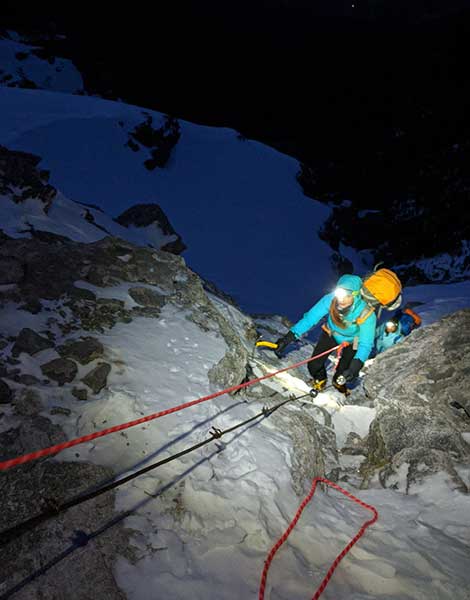
© Orestis Mitrou
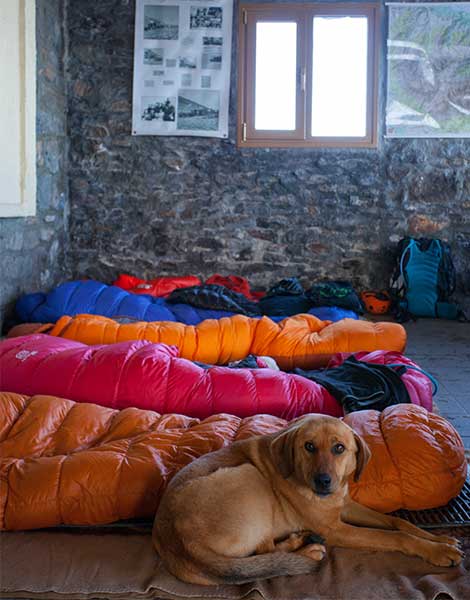
© Olga Charami
In winter, the mountain paths are transformed. You walk straight up the slopes and scree fields vertically, cutting across the traverses that make the ascent easier in the summer. The Muses Plateau refuges are closed during winter; we thus had to carry all the necessary overnight equipment on our shoulders, which greatly added to our burden.
We were running out of time and I was terrified, thinking that nightfall would find us in the middle of nowhere. The sun was receding and the wind started blowing. At that moment, all the harrowing stories of people that had been up here during winter came rushing back to me: tales of avalanches, snow storms, falls and other terrifying events. Such memories always return at the worst times.
We reached the Skourta summit towards the evening. I had been particularly worried about two spots from the start: the famous Laimos (neck), a narrow, kilometer-long ridge stretching above the void, and the Giosos pass, a small vertical rock which requires a bit of climbing. Fate was calling me to go through both of these at night.
Once we passed Skourta, I was practically running; exhaustion had given way to the hope of making it in time for the last light of the day. I have never crossed the Laimos ridge so fast, not even in summer. As for the Giosos pass, it seemed like a piece of cake as I was tied with a rope and felt safe. The only time I felt scared was when we passed along a cliff edge between Laimos and Giosos, which had started freezing as night fell; I was stomping my crampons with such force into the snow that my ankle still hurt a month later.
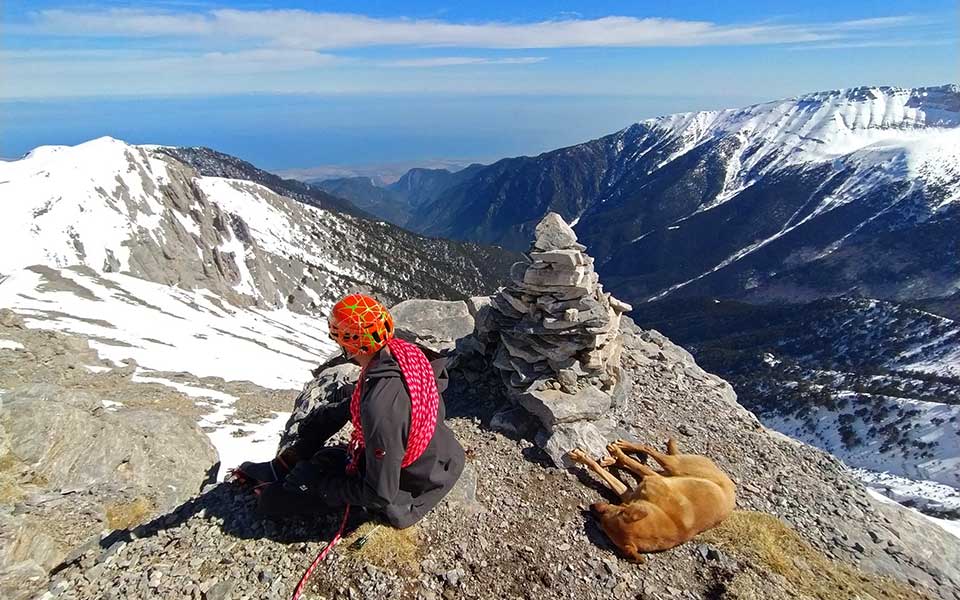
© Olga Charami
We walked the last few kilometers in the dark of the cold, moonless night. Tears were streaming down my face; I was dragging my feet and my toes were completely numb. Just when I thought we would never arrive, we noticed a faint light: it was the Giosos Apostolidis refuge, where the main hall remains unlocked in winter, so adventurers can avoid carrying tents.
The snow was so deep that we could only get in through the window. In a space usually filled with dozens of people dining at tables, we were welcomed in the dark by a total of nine people in two small groups. I sat on the floor, exhausted and struggling to realize where I was.
My friends took charge of all the chores. It was extremely cold, even inside the hall, and sleeping on the floor offered little comfort. But there is no room for complaints up there. We exchanged goods that seemed precious given the circumstances: a cereal bar, a chocolate bar, a beer, a memory from the mountain…
Two tea lights were lit, rum was offered, and we all went to sleep without difficulty.

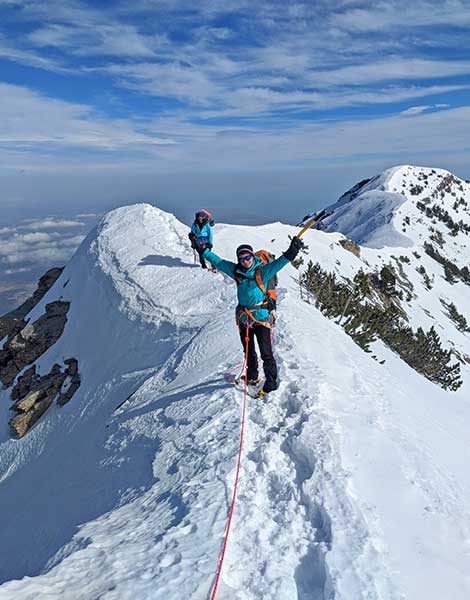
© Orestis Mitrou
I was the first to wake up, at dawn. A dozen sleeping bags were lined up on the ground and a dog was wagging its tail. It was Hera, the Mt Olympus dog, who escorts hikers sometimes as high as the Mytikas summit.
The windows were foggy because of the difference in temperature. Outside, the sight unfolding before my eyes was one of the most beautiful on Earth. The Plateau of the Muses, white with snow, seemed slightly pink at first light. The imposing Stefani peak, was impressive as ever; silence was king, and I took great pleasure in drinking my Greek coffee, despite the fact that it was in a plastic cup and made with melted snow.
The mountain had gifted us with a calm, sunny day. We strolled around in the snow, running and rolling about the fields – sliding, ice skating and even throwing snowballs at each other. We stepped on all types of terrain – soft snow, crunchy snow and sheer ice – walked up the surrounding small peaks to find the best view to photograph, looking at the world and breathing it in as if for the very first time.
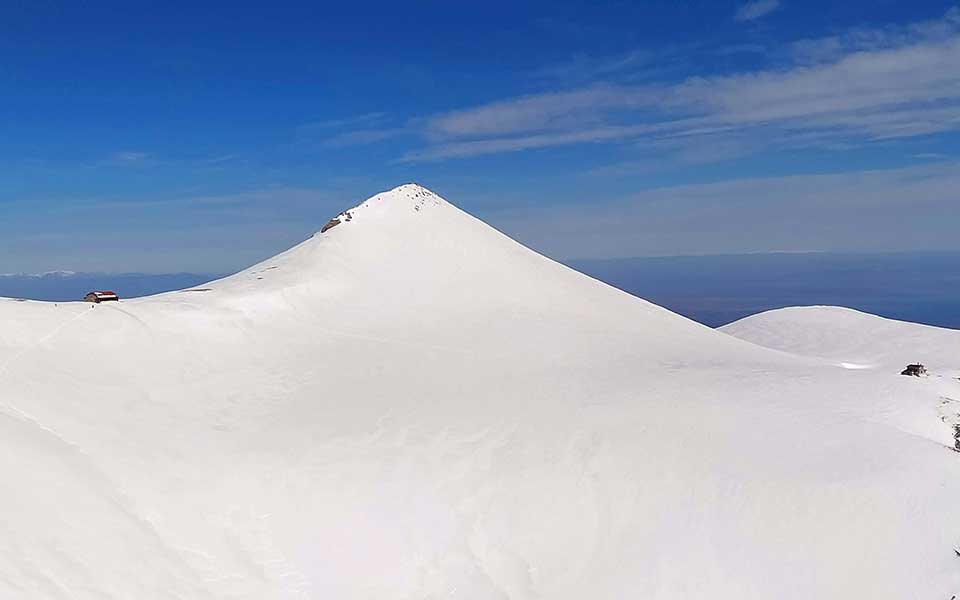
A view of the Apostolidis and Kakkalos refuges
© Olga Charami
The traverse that crosses the base of the Stefani massif left us in awe; we felt like Playmobil figures dwarfed by the vast mountain. The surrounding view was breathtaking, with nothing but white mountain ranges and two refuges – Apostolidis and Kakkalos – on one side, which looked like toys from a distance. On the other side lay the coast and the sea, and the famous gullies leading to the summits of Mytikas and Stefani.
We had only started walking when fear returned to haunt me: Everyone else was moving forward smoothly on their crampons while I was on all fours, alternating between crampons and ice axes in the snow, staring down a never-ending cliff. Each step I took felt a matter of life and death – I had never imagined that I would come to love an ice axe so much! In the end, we didn’t reach the summits, and my friend Yiannis probably still resents me for that.
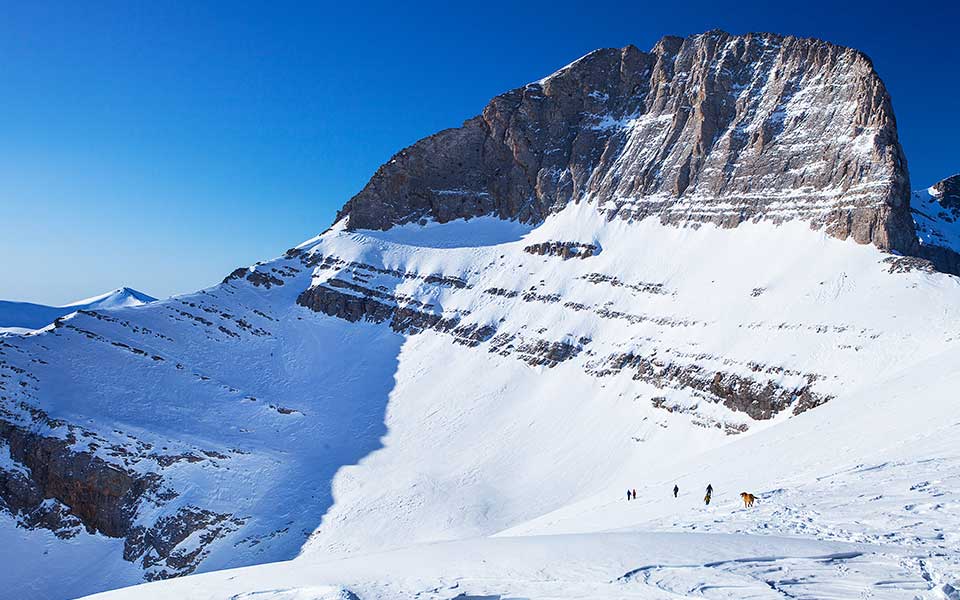
© Olga Charami
Time was too short – or maybe I’m just making up excuses for myself. The hours were passing by and the weather forecast warned of gales for the next day; it was time for us to leave the mountain altogether.
But we didn’t. The company at the refuge was pleasant, the sun had shone all day and the sunset, with its pink colors, whispering air, and clouds magically rising from the Kazania cirque were of ethereal beauty. Night fell again, full of stars; we were alone with the mountain, and were filled with awe in the face of this indescribable sight. I was speechless. Whenever someone spoke to me, replying required tremendous effort on my part.
Naturally we paid for all this the next day when Mt Olympus furiously repelled us. The refuge had trembled at the force of the wind, the sky was falling on us and gusts literally threw us to the ground. I hastened down again, holding on to my axe as if it were an extension of my arm, to avoid being blown away.
Six hours later, the only thing that scared us were the crowds and the bustle in Litochoro. Never before had we felt so out of place, like aliens who had come from another world.
With fewer tourists, sunlit harbors, and...
A challenging summer ride across the...
From historic landmarks to edgy street...
This spring, five majestic peaks across...